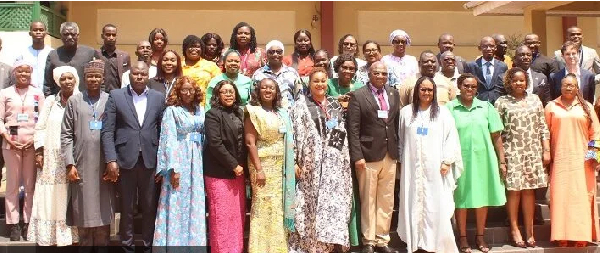The Economic Community of West African States (ECOWAS) Gender and Development Centre yesterday began a three-day workshop in Accra.
It is aimed at building the capacity of focal persons to manage and operationalise the Gender Observatory Centre to be established in member countries.
The three-day event is also expected to equip the participants with the necessary skills in digital platform usage, design, generation and development, data collection, data analysis and reporting as well as methods in gender statistics reporting and E-learning.
Speaking at the ceremony, the Director of the ECOWAS Gender Development Centre, Sandra Oulate Fattoh, indicated that the workshop would go a long way to empower gender equality aimed at promoting the sustainability and periodisation of the Sustainable Development Goals.
According to her, in spite of the gender equality and women's empowerment, the continent is still faced with widespread disparities and inequalities characterised by the marginalisation of women and the absence of adequate opportunities for women to participate effectively in the development processes and to share equitably in the gains of development.
It was to address these challenges that the Centre was organising this training workshop to have a robust database system to provide the necessary gender statistics necessary for decision making.
Fattoh commended the United States Agency for International Development (USAID), United Nations Development Programme (UNDP), African Union and other stakeholders whose contribution has brought the centre to fruition.
The Minister of Gender, Children and Social Protection, Dakoa Newman, said data analysis and management was vital in the discharge of work as gender experts and advocates in order to effectively help in proper planning towards taking informed decisions.
The essence of the training she explained, cannot be underestimated as it recognizes the sub-region as a just and secure society in which men and women have equal opportunities to participate, decide, control and benefit from all development initiatives, thus ensuring that no one is left behind in the developmental process in Member States.
In Ghana, the Minister indicated that the Ministry has been mandated to coordinate and ensure gender equality and equity as well as integrate the fulfilment of the rights, empowerment and full participation into national development. "I am happy to announce that the Parliament of Ghana in July 2024 has passed the Affirmative Action (Gender Equity) Bill into Law.
The passage of this Law will help to effectively and efficiently address gender imbalances in the political, social, economic, educational and cultural spheres of the Ghanaian society," she added.
The Director, Women, Gender, and Youth Directorate of the AU Commission, Ms Prudence Ngwenya, also commended the ECOWAS Centre for the bold steps taken to improve accountability of policies taken by member states and assured of the Commission's resolve to ensure that decisions taken at the other regional blocs would help promote gender equality on the African continent.
Mrs Cleopatra Orongo on behalf of the Director, United Nations Development Programme (UNDP) Regional Service Centre for Africa, Dr Mathias Naab, said the Gender Observatory when fully implemented would link other observatories in order to improve upon the continent's commitments to its people.
She assured of the commission's commitment to work with the centre to ensure that the objectives of the centre are achieved.

